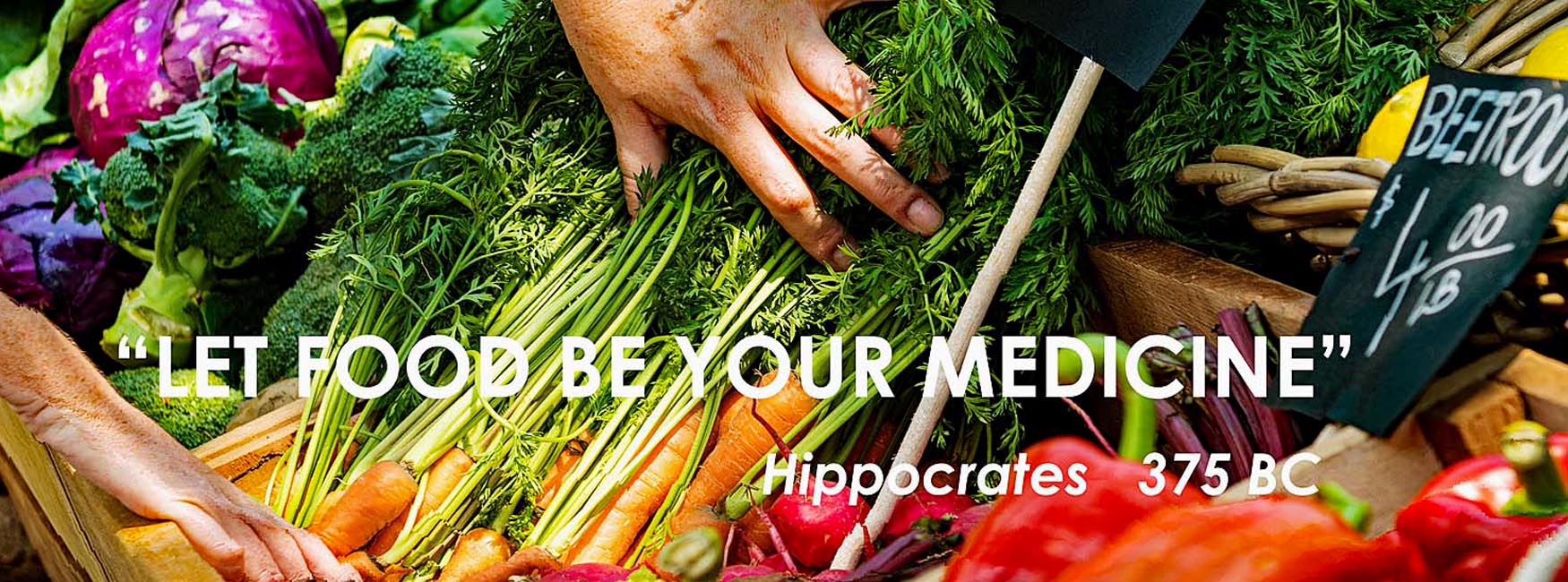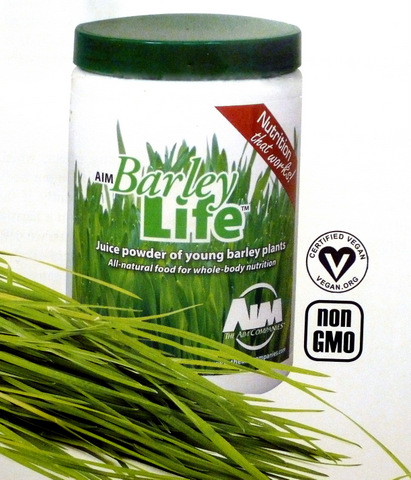Everyone Needs Calcium Rich Foods
Calcium rich foods are everywhere, especially in plants! If you eat a plant based diet you will get all the calcium that you need.
We have all been taught by the multi-million dollar annual ad campaigns of the dairy industry that the best way to get your calcium is by consuming milk. It is true that you can get an ample supply of calcium from milk, but you will also get an over abundant supply of protein, fat, growth hormones, estrogen, IGF-1, antibiotics AND among other things, chemicals that include dioxin, one of the most toxic substances known to man.
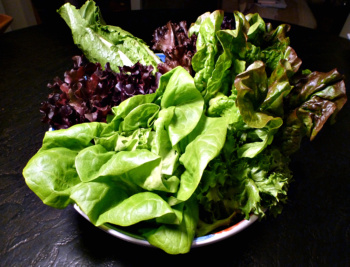 A salad a day will help keep the doctor away!
A salad a day will help keep the doctor away!A cup of milk contains 300 mg of calcium, and a cup of collard greens also has 300mg of calcium.
Green vegetables have a calcium absorption rate of over 50% compared to milk at about 32%. All green vegetables are calcium rich foods!
As we have learned from The China Study and other publications, too much animal protein induces calcium depletion in the urine. The consumption of vegetable protein promotes a much higher retention of calcium.
Too Much Animal Protein
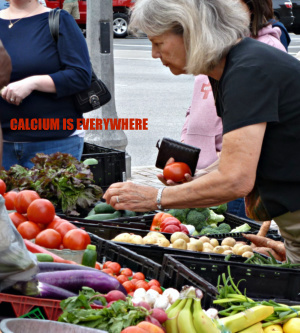
Here is a problem to think about! If consuming milk was beneficial to making strong bones, then why is it the countries that are the leading consumers of dairy have the most fractures and suffer from osteoporosis?
The USA and the Scandinavian countries are the front runners and take the prize for the highest incidence of these chronic conditions.
Most of the world does not eat dairy products and do not have bone problems or a deficiency of calcium. There is something terribly wrong with the message that milk (and milk products) will give us healthy bones.
The average American diet is centered around animal foods, processed foods, and refined grains which do not contain major amounts of calcium, unless it has been added. The need for calcium rich foods obviously becomes necessary with this kind of diet.
The Problem!
Calcium and other alkaline forming minerals are eliminated in the urine because of an excessive acid condition caused by animal products in the diet.
In addition to the benefits of calcium rich foods for a strong body, we need to incorporate other beneficial sources such as potassium, magnesium, vitamin D and K, phytochemicals and micronutrients found in plants.
The following are some signs of a deficiency of calcium:
- twitching
- nerve sensitivity
- brittle nails
- heart palpitations
- depression
- numbness
- insomnia
- nausea
- vomiting
- constipation
- dry mouth
- thirst
- frequent urination
- muscle cramps in the calves during pregnancy
- in extreme cases, confusion
- delirium
- coma
- even death, which can follow not being treated
According to The Linus Pauling Institute at Oregon State University, "Abnormally elevated blood calcium (hypercalcemia) resulting from the over consumption of calcium has never been documented to occur from foods, only from calcium supplements."
Get Stronger Bones With Calcium Rich Foods!
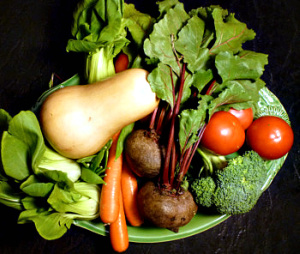 A bowl of calcium rich foods!
A bowl of calcium rich foods!When you eat a healthy diet of unrefined plant foods such as vegetables, fruits, legumes, seeds and nuts, you are eating calcium rich foods and other necessary minerals that are important for your system to maintain a strong body.
Research has shown that those who eat a plant based diet have stronger bones. We also know that a vegetable based diet makes the body alkaline. Even ingestion of large amounts of vegetable protein do not seem to create an acid condition.
When you have an alkaline system you do not excrete large amounts of calcium from the body. This makes the need for calcium supplements unnecessary in most cases. The best calcium supplement is to consume a variety of vegetables that will insure a more than adequate supply for the body. Too much supplemental calcium can lead to adverse medical complications such as cardiovascular issues, osteoporosis and bone density problems, prostate cancer, kidney stones, Alzheimer's disease, dental plaque, Hypothyroidism, as well as many other detrimental conditions.
The National Institute of Health (NIH) has made the following recommendations for different age groups for the adequate amount of calcium in the diet.
|
Male and Female Age 0 to 6 months 7 to 12 months 1 to 3 years 4 to 8 years 9 to 13 years 14 to 18 years 19 to 50 years 51+ years Pregnant/Lactating Women |
Calcium (mg per day) 210 270 500 800 1300 1300 1000 1200 1000 |
Reviewing the many articles and studies on the correct amount of calcium to take daily can leave you somewhat confused.
Vegetarians seem to require a great less calcium intake than the NIH recommendations. Dr. John McDougall takes a different slant on the issue. I tend to follow his view.
Dr. McDougall explains, "Studies have shown that an intake of 150 to 200 mg of calcium daily is adequate to meet the needs of most people, even during pregnancy and lactation.
Most of the world's population ingests 300 to 500 mg of calcium each
day. Calcium is so efficiently absorbed by the human intestine and so
sufficient in diets of mankind, that calcium deficiency of dietary
origin is unknown in human beings. Only in those places where calcium and protein are eaten in high quantities does a deficiency in bone calcium exist in such epidemic rates, due to an excess of animal protein."
Some of the factors that induce calcium loss are:
- animal products
- salt
- caffeine
- refined sugar
- alcohol
- nicotine
- vitamin A supplements
- aluminum-containing antacids
- sodas (phosphorus loss)
- antibiotics
- steroids
- sedentary lifestyle
Let's take a look at some calcium rich foods that you should incorporate into your diet.
The following values are taken from charts produced by the USDA National Nutrient Database for Standard Reference. I have chosen a few examples so that you may better understand where the most calcium is found.
Nuts, Seeds, Beans, Grains
And Cereals are Calcium Rich Foods
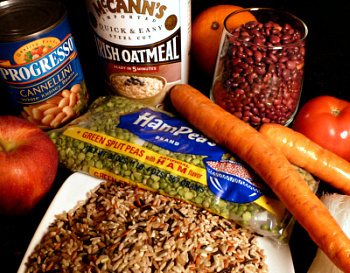 Make sure you have a good supply of these calcium rich foods on hand.
Make sure you have a good supply of these calcium rich foods on hand.Calcium in Raw Nuts and Seeds (shelled)
Nuts & Seeds (1 ounce)/MilligramsAlmonds 70.0
Flaxseeds 18.0
Pistachio 30.0
Sesame seeds, roasted 37.0
Walnut, English 28.0
Calcium in Beans (dried, cooked)
Beans 1 cup/MilligramsAdzuki Beans (Aduki) 64.0
Black Beans 46.0
Black-eyed Peas (Cowpeas) 39.0
Fava Beans (Broadbeans) 61.0
Great Northern Beans 120.0
Kidney Beans 50.0
Lentils 38.0
Lima Beans, large 32.0
Soybeans 175.0
Split Peas 27.0
Calcium in Grains (cooked)
Grain 1 cup/MilligramsRice, brown (long grain) 20.0
Rice, white 16.0
Rice, wild 5.0
Wheat germ, toasted 51.0
Calcium in Ready-to-Eat Cereals
Cereal 1 cup/MilligramsGeneral Mills Basic Four 250.0
General Mills Fiber One 200.0
General Mills Total Raisin Bran 1000.0
Kellogg's All Bran 242.0
Quaker Oat Life Plain 150.0
Quaker Cinnamon Life 138.0
Vegetables and Dried Fruit Are Also Calcium Rich Foods
 The USDA's Dietary Guidelines recommend adults eat anywhere from 5 to 13 servings of fruits and vegetables per day.
The USDA's Dietary Guidelines recommend adults eat anywhere from 5 to 13 servings of fruits and vegetables per day.Calcium in Fresh Vegetables (cooked)
Vegetable 1/2 cup/MilligramsAsparagus 21.0
Broccoli, chopped 31.0
Brussels Sprouts 28.0
Cabbage, Green 36.0
Carrots, sliced 23.0
Cauliflower 10.0
Okra, sliced 62.0
Parsnips 29.0
Peas 43.0
Vegetable 1 cup/Milligrams
Bok Choy 158.0
Celery, diced 63.0
Collards 266.0
Kale 94.0
Onions 46.0
Spinach 245.0
Squash, Acorn, cubed 90.0
Squash, Butternut, cubed 84.0
Turnip greens 107.0
Vegetable 1 medium/Milligrams
Artichoke 54.0
Sweet Potato, with skin 43.0
Calcium in Dried Fruits
Dried Fruit/MilligramsDates, Medjool, 1 date 15.0
Figs, 1/2 cup, chopped 120.5
Raisins, dark, 1/2 cup 36.0
Western civilization seems to punish itself by eating too much animal protein. The acid condition created by this excess leads to many chronic medical problems.
Plant food on the other hand, creates an alkaline body that permits good health. By consuming plants, that by their nature are calcium rich foods, you can be assured of adequate minerals to sustain strong bones.
Read more...
Osteoporosis Treatments - And why they do not work!
